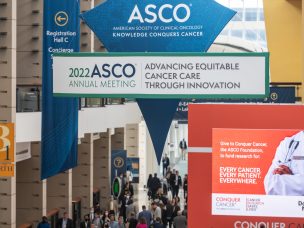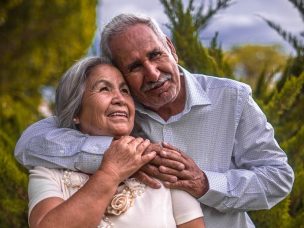Medical News
Enhancing Combinational Therapy for R/R Hodgkin Lymphoma
Treatment options for classical Hodgkin lymphoma (cHL) have expanded to the use of multiple chemotherapy drugs that have increased 5-year survival rates to approximately 90%. However, 20-30% of treated patients will experience progression or relapse of the disease at some point after treatment [1]. Disease progression or relapse is often dealt with through the use...
Highlights From ASCO 2022 on Brentuximab Vedotin for CHL
Photo by © ASCO/Nick Agro 2022. Written and edited by Lauren Weinand, M.D. Two groundbreaking studies presented at the 2022 ASCO Annual Meeting discussed the use of brentuximab vedotin to treat classical Hodgkin lymphoma (CHL) in adults as well as children and adolescents. Here are some of the highlights, including MD Newsline’s Q&A session with...
Overall Survival Improved With Brentuximab Vedotin and Chemo Combo
The conventional treatment modality for stage III or IV Hodgkin lymphoma has been doxorubicin, bleomycin, vinblastine, and dacarbazine (ABVD), which has remained unmodified over the years. However, a significant percentage of patients experience relapse or refractory disease after treatment with ABVD. New treatment methods, namely treatment regimens with brentuximab vedotin, have proven to be relatively...
A Non-Invasive Technique to Detect Lymphoma
Lymphoma is a common cancer that includes Hodgkin lymphoma (HL), among others. Excisional lymph node biopsy, immunohistochemistry, and in situ hybridization are used to diagnose and classify lymphoma. However, invasive biopsies have significant limitations and risks, and they do not take into account differences between and within tumors because they only take a sample from...
Predictors of Secondary Lung Cancer Among HL Survivors
There is insufficient data to address the incidence rate and risk factors for secondary lung cancer among Hodgkin lymphoma survivors. In this study, published in the Journal of Clinical Oncology for the 2022 ASCO Annual Meeting, data from a cohort of Hodgkin lymphoma patients diagnosed between 1973 and 2015 were investigated using the Surveillance Epidemiology and End...
Monoclonal Antibodies For Allo-SCT and CAR-T Cell Recipients With COVID-19
Patients who receive chimeric antigen receptor (CAR) T-cell therapy or allogeneic stem cell transplants (allo-SCT) often exhibit some form of immunosuppression as a result of their treatment or transplant. In the era of COVID-19, severe disease has emerged as a grave concern in high-risk CAR T-cell therapy and allo-SCT patients who may have weakened immune...
Next Generation Armored CAR-T Therapy Shows Promise
CAR T-cell therapy has gained attention as an increasingly promising cellular therapy. However, while CAR T-cells are highly targeted and effective treatments for certain cancers, they often face mounting obstacles from the tumor microenvironment (TME). Tumors release different immune-suppressing molecules and disrupt the activity of CAR T-cells and other tumor-infiltrating lymphocytes (TILs). Another factor to...
Brentuximab Vedotin in Children With Hodgkin Lymphoma
The goal of treatment for Hodgkin lymphoma (HL) in children is similar to that of adults: cure the disease without causing long-term complications. Brentuximab vedotin (Bv) is a CD30-directed antibody-drug conjugate approved for adults with advanced HL. However, studies have found that Bv may also be a safe and effective treatment for children and adolescents with...
Cardiovascular Comorbidities Linked to Radiation Therapy in HL
Hodgkin lymphoma (HL) is a rare but treatable disease that is curable in around 75% of affected patients. Although the survival of HL has been improved through available treatment options, treatment modalities may cause adverse events and comorbidities that are of particular concern. The cornerstone of therapy for HL includes chemotherapy in combination with radiation...
More Medical News














